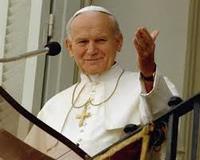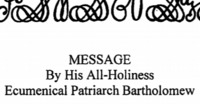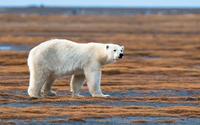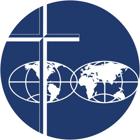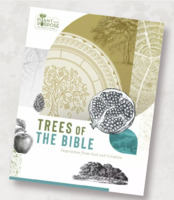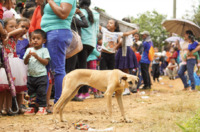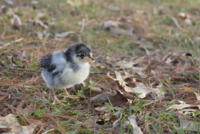Search
68 items
-
Buddhist Faith Statement on the Environment
Interfaith Center for Sustainable Development posted a Buddhist faith statement on the environment on their website. According to the Vietnamese monk Venerable Thich Nhat Hanh:
“Buddhists believe that the reality of the interconnectedness of human beings, society and Nature will reveal itself more and more to us as we gradually recover—as we gradually cease to be possessed by anxiety, fear, and the dispersion of the mind. Among the three—human beings, society, and Nature—it is us who begin to effect change. But in order to effect change we must recover ourselves, one must be whole. Since this requires the kind of environment favorable to one’s healing, one must seek the kind of lifestyle that is free from the destruction of one’s humanness. Efforts to change the environment and to change oneself are both necessary. But we know how difficult it is to change the environment if individuals themselves are not in a state of equilibrium.” -
Christian Ecology
Interfaith Center for Sustainability Development posted a Christian ecology statement, based on the 1995 Windsor Statements, on their website. The following is an excerpt discussing the challenges that have persisted over time with regard to the care for creation:
"In the words of the Orthodox Patriarchate, ‘This may well mean that just as a shepherd will in times of greatest hazard lay down his life for his flock, so human beings may need to forego part of their wants and needs in order that the survival of the natural world can be assured.'
The challenge to all Christians is to discover anew the truth that God’s love and liberation is for all creation, not just humanity, and to seek new ways of living that restore balance and hope of life to the endangered planet." -
Pope Francis' Speech on UN World Environment Day
Pope Francis's speech on the United Nations World Environment Day emphasizes the importance of world solidarity to counter what he deems a current culture of waste. One prevailing message is the danger of consumerism. The pope extends a challenges to forgo excessive wealth in exchange for living a more simplistic lifestyle, which can help combat world health and hunger issues. -
Common Declaration on Environmental Ethics
On June 10, 2002, Pope John Paul II and Ecumenical Patriarch Bartholomew I issued a declaration on the environment. The introduction to the declaration is stated below:
"We are gathered here today in the spirit of peace for the good of all human beings and for the care of creation. At this moment in history, at the beginning of the third millennium, we are saddened to see the daily suffering of a great number of people from violence, starvation, poverty and disease. We are also concerned about the negative consequences for humanity and for all creation resulting from the degradation of some basic natural resources such as water, air and land, brought about by an economic and technological progress which does not recognize and take into account its limits." -
Message by His All-Holiness Ecumenical Patriarch Bartholomew to the United Nations Conference of the Parties (COP 24) (Poland)
Ecumenical Patriarch Bartholomew I of Constantinople addressed the United Nations of the Parties (COP 24) in Poland, December 3-14, 2018. He emphasized the collective responsibility among all citizens to alleviate the climate problems. One key point includes the urgency to focus on lighter carbon footprints to preserve the Earth to assist in alleviating poverty and suffering.
-
The Sierra Club Efforts to Protect Wildlife
The Sierra Club is a nonprofit Environmental organization based in the United States and was created in 1892. Among their many environmental initiatives they plan on conserving wildlife. The Sierra Clubs goal is to protect 30% of the natural world by 2030. Not only will preserving the land wildlife it will also provide people with clean water, clean air, and climate stability. This article describes the Sierra Clubs involvement with Endangered Species Day. -
Columban Center for Advocacy and Outreach
The Columban Center for Advocacy and Outreach (CCAO) was founded in 1985 as the national advocacy office for the Missionary Society of St. Columban in the United States.
CCAO serves as the line of communication between Columban missionaries on the ground and policy-makers in Washington, D.C. Their mission is to work towards a more just, peaceful, and environmentally sustainable world by engaging in the political process guided by our faith and the Gospel. They work for structural change for the poor and marginalized populations Columbans serve around the world. Moreover, they advocate for policies and structures that bring society and the world into the right relationships with all of God’s Creation.
CCAO follows Catholic Social Teaching as their lens to engage in legislative advocacy and community engagement. -
Catholic Social Teaching and Humane Education
"A discussion surrounding the challenges educators, parents, and supporters of animal welfare face in teaching compassion to children.
This event will be held at Fordham Lincoln Center (113 W 60th Street, Manhattan, NY, 10023) for in person folks, with a Zoom option. Specific room information or a Zoom link will be sent out the week prior to the conference." -
Trees of the Bible
"What does the Bible have to say about trees?
A lot, actually. In this guide, we explore nine trees of significance in Scripture to better understand the context of the passages and our relationship with the Creator (of trees and people)." -
Nativities and the Natural World
Housed at the University of Dayton Roesch Library Building, this exhibit is available Nov. 20, 2023 through Jan. 12, 2024.
"Explore the intersection of Christmas and nature through the Marian Library’s Nativity sets, artwork and more. In this exhibit, artists incorporate plants and animals from around the world into the Christmas story. Gourds, straw, wood, mother-of-pearl and beeswax are among the materials used to create Nativity sets that reflect the natural world in which Christ was born." -
Field of Milkweeds
"Field of milkweeds remind us of the essential role of native plants and pollinators''. Taken by Karima Samadi. Submitted to the Sustainability Photo Contest. -
A Stray Dog in Honduras
"A stray dog in Honduras. I took this photo during a medical brigade trip to Honduras. The dog is standing infront of a line of people waiting for medical attention. Our team was able to provide car to over 1,000 local individuals. The members of these less fortunate communities work hard to live a sustainable lifestyle without the items we take for granted on a daily basis. I care about this subject because the trip was eye opening experience for me."
Taken by Nate Landever. Submitted to the Sustainability Photo Contest. -
Backpackers
"Backpackers hike through green woods in this peaceful mountain setting, with a soft gray sky overhead. Cows graze in the area nearby, blending in perfectly with the quiet surroundings. This harmonious existence is a representation of sustainable life, in which people and animals coexist on the land with appreciation and respect. We guarantee the protection of this natural sanctuary so that future generations can continue to appreciate its unspoiled beauty through ethical exploration and efforts to conserve." Taken by Eszter Horompoli-Toth. Submitted to the RESTORExchange Sustainability Photo Contest. -
My Flock
"Pictured is a chick I am raising for my flock. The chickens are raised with sustainable feeding methods, including grazing for worms, bugs, and plants outside. Their waste is used as fertilizer for my summer garden!" Taken by Reily Jacobs Bell. Submitted to the RESTORExchange Sustainability Photo Contest. -
Green 💚
"Green 💚". Taken by Mohamed Ibrahim. Submitted to the RESTORExchange Sustainability Photo Contest. -
Monarch Caterpillars
"Monarch caterpillars eating native milkweed at the UAB Solar House. These caterpillars were put on milkweed surrounding the Solar House to help the Monarch butterfly population. This photo is important becuase it shows that if we want to support our native species we need to plant native host plants. The UAB Solar House has native plants in abundance to show the public that if you plant natives then the native species will come!" Taken by Emily Colpack. Submitted to the RESTORExchange Sustainability Photo Contest. -
Mother Giraffe
"Mother giraffe walking through rhino sanctuary in Laikipia, Kenya". Taken by Kayla Geller. Submitted to the RESTORExchange Sustainability Photo Contest. -
El Niño caused the greatest ever mass extinction
This article describes new updated research that shows the weather event El Niño has led to the worst mass extinction. El Niño causes the ocean to become warmer all leading back to climate change. Marine ecosystems and terrestrials are suffering greatly because of volcanic eruptions occurring. Mass extinctions are very damaging and mess up multiple ecosystems causing more destructiveness than we realize.




